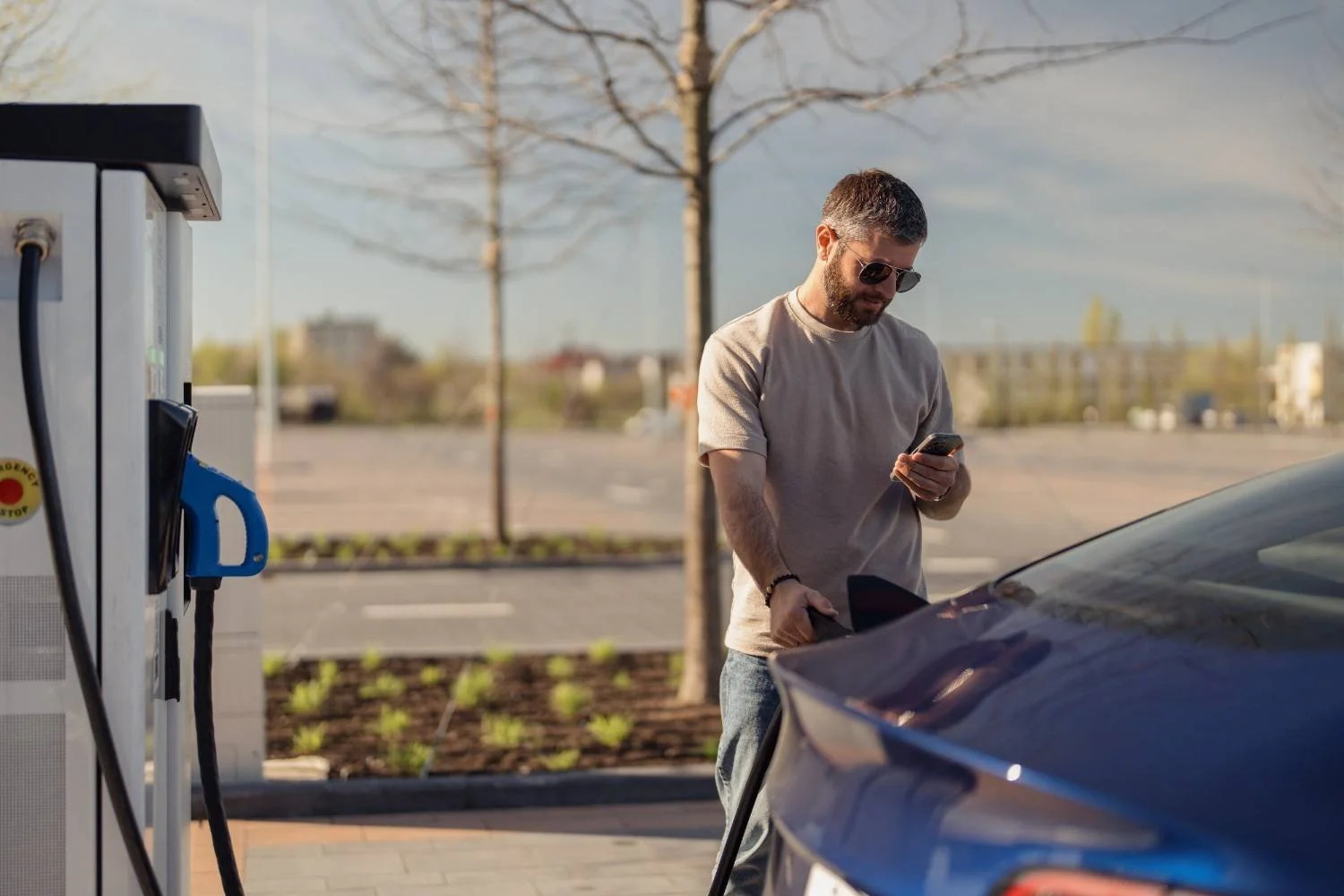Business EV Charging Solutions: How Salary Sacrifice Transforms Fleet Operations
Source: Shutterstock
The shift to electric vehicles has reached an important point for enterprise fleet operations across the UK, driven by the 2023 petrol and diesel ban and government support for EVs. While forward-thinking businesses recognise the role of electric cars, others are finding that EV charging can create unexpected operational challenges and costs.
For fleet managers and business leaders overseeing large-scale vehicle operations, the question isn't whether to go electric - it's about making the transition work smoothly for everyone involved. And that means rethinking how companies handle EV charging costs.
The Enterprise EV Charging Challenge
Many businesses think their role ends once they've set up an EV salary sacrifice scheme. But with charging costs rising in recent years, fewer people are making the switch from petrol or diesel to electric, especially if they don't have a driveway for home charging.
This creates a new challenge for enterprises. Having electric vehicles available through salary sacrifice is only half the solution. If employees find charging too complicated and expensive, even the best EV schemes will struggle with poor uptake.
The Main Challenges With EV Charging For Enterprises Are:
Infrastructure complexity - Managing charging across multiple sites and shift patterns
Financial disconnect - Public charging often costs more than petrol or diesel
Admin nightmare - Complex reimbursement processes overwhelm teams
Employee barriers - Many staff can't install home chargers or face expensive public charging
Companies often find that their carefully planned EV rollouts hit unexpected roadblocks. Employees express interest in electric vehicles but hesitate when they understand the real-world charging costs and complexity. This hesitation directly impacts adoption rates and can slow progress toward sustainability targets, regardless of how good the vehicle selection or lease terms might be.
Current Fleet Charging Limitations
Most enterprise EV charging schemes have blind spots. Traditional EV charging solutions focus on infrastructure but ignore the reality of how employees actually charge their vehicles.
Think about a typical company car driver: they charge at home overnight, top up at the office during the day, and use rapid charging on longer trips. Each scenario involves different costs, payment methods, and paperwork. Without a unified system, this complexity puts people off and creates extra admin
The Problem With Traditional Approaches:
Multiple payment systems across home, work, and public charging
Endless expense claims and reimbursement delays
Access isn’t equal - not everyone can charge conveniently
Unpredictable costs that make budgeting difficult
Manual processes that break down with larger fleets
These problems get worse as you scale up. A business with 50 electric vehicles may be able to muddle through with manual processes, but companies with hundreds or thousands of EVs need systems that work consistently.
How Salary Sacrifice Transforms Operations
Salary sacrifice fleet charging changes everything. Until now, there wasn’t a solution where employees could salary sacrifice their EV charging costs. The Charge Scheme is the first and only platform that makes this possible, creating an entirely new approach to enterprise fleet charging.
Here's how it works: employees pay for all their charging - home, work, or public - through salary sacrifice. No more complex expense claims. No more waiting for reimbursements. Just savings of 20-50% on charging costs, taken straight from gross salary before tax.
What This Breakthrough Means:
One payment system for all charging scenarios
Instant savings of 20-50% for employees
No more expense forms or reimbursement delays
Simple payroll adjustments instead of variable claims
Better charging habits when costs become affordable
For businesses, this creates clarity. Finance teams get straightforward payroll adjustments instead of processing hundreds of expense claims. Fleet managers can focus on efficiency instead of cost administration. HR teams get a benefit that employees actually value and want.
Companies using salary sacrifice for charging are more likely to see higher EV scheme uptake. When employees know electric vehicles are cheaper to run than their petrol alternatives, they're more likely to make the switch.
Scalability and Enterprise Implementation
Large-scale EV charging solutions need to work consistently. The Charge Scheme scales naturally because it builds onto your existing payroll system, meaning no new admin headaches are required.
Rolling out salary sacrifice charging across multiple locations is straightforward. Whether employees work in London, Manchester, or Edinburgh, the same system provides consistent savings.
Why The Charge Scheme Scales So Well:
Geographic consistency - same system works nationwide
Payroll integration - builds on existing HR workflows
Universal coverage - works regardless of employee circumstances
Fleet flexibility - handles owned, leased, and employee vehicles
Growth-ready - scales without proportional admin increases
The technology integrates seamlessly with existing payroll systems. You don't need new suppliers or procurement processes; it works with the HR and finance workflows you already use. This reduces risk and speeds up implementation.
For businesses with different EV arrangements, salary sacrifice charging provides consistent savings across different vehicle categories, supporting flexible fleet strategies while keeping operations simple.
Making EV Charging Cheaper Across Your Fleet
When you're running a large fleet, every cost matters. You need solutions that save money and cut admin headaches at the same time. That's exactly what salary sacrifice charging does. The savings start immediately. Your employees save 20-50% on the cost of charging.
Where The Savings Come From:
Direct employee savings - £500-£1,000 annually per person
Administrative efficiency - eliminated expense processing costs
Budget predictability - known costs integrated into payroll
Tax advantages - reduced National Insurance for employers and employees
Simplified auditing - streamlined financial processes
The administrative savings often exceed the direct charging savings. Every expense claim means time spent checking receipts, working out business versus personal mileage, and processing payments. With different charging networks and prices, it adds up fast. Salary sacrifice cuts through all that. Your people charge, we calculate, and it goes through payroll. Simple.
You'll also know exactly what you're spending each month. No surprise expense claims that vary with long trips or different charging locations. Everything's predictable and built into your normal payroll process.
Employee Engagement and Retention
Business EV charging solutions that put employee experience first create competitive advantages. When companies genuinely support their people's move to sustainable transport, it resonates strongly with today's workforce.
The financial impact is substantial and immediate. Annual savings provide meaningful relief during cost-of-living pressures. This benefit is particularly valued because it affects everyday activities rather than abstract perks employees might never use.
What Employees Gain:
Meaningful financial relief - substantial cost-of-living support
Simplified processes - no receipt tracking or expense claims
Confidence boost - removes anxiety about EV charging costs
Unique benefit - hard to replace in competitive job markets
Values alignment - supports personal sustainability goals
Salary sacrifice charging removes the barriers that stop employees choosing electric vehicles. Many people are interested in EVs but worry about charging costs and complexity. When businesses provide clear, simple solutions that make electric vehicles genuinely cheaper to run, employee confidence increases dramatically.
From a retention perspective, 83% of millennials report being more loyal to companies that prioritise environmental sustainability. EV salary sacrifice charging creates natural retention incentives, especially in competitive talent markets.
Sustainability and Corporate Goals
When charging becomes affordable through salary sacrifice, businesses may expect to see an increase in EV scheme uptake. This acceleration helps businesses reach Net Zero targets faster while showing its commitment to sustainability.
Impact of Sustainability:
Quicker EV adoption - salary sacrifice charging removes another financial barrier to uptake
Transparent ESG data - clear reporting on actual usage patterns
Cultural transformation - practical support builds environmental engagement
Authentic commitment - meaningful action, not just policy statements
Ripple effects - increased interest in sustainable transport across teams
The transparency helps with ESG reporting requirements because charging costs go through payroll systems, businesses get clear visibility into actual EV usage patterns and carbon reductions. This data supports accurate sustainability reporting and demonstrates real progress.
Employee engagement with corporate sustainability initiatives often increases when businesses provide practical support for environmental choices. Salary sacrifice charging represents a tangible action that helps employees make sustainable transport decisions.
How Companies Are Saving with The Charge Scheme
Real-world examples demonstrate the transformational impact of salary sacrifice charging on businesses. Europa Worldwide Group, a logistics company with 1,300 employees across multiple sites, implemented The Charge Scheme to support its distributed workforce.
Amy Gordon, HR Coordinator, explains: "For a logistics company like ours with team members on the move across various sites, the ability for our staff to save 20-50% on all charging costs through salary sacrifice has been transformative in encouraging the switch to electric vehicles."
The Charge Scheme Delivered Results:
Complex expense processing has been eliminated
Reduced admin burden on HR teams
Substantial cost savings for employees
Geographic flexibility across multiple sites
Shaw Education Trust, managing over 2,000 employees across 32 academies, also implemented The Charge Scheme earlier this year. Stephen Watson, Chief People Officer, noted: "Since implementing The Charge Scheme as a zero-cost addition to our benefits package, we've seen remarkable enthusiasm from our team."
Both organisations report that the combination of employee cost savings and minimal admin creates compelling value propositions for continued investment in EV charging support.
What to Consider When Implementing The Charge Scheme
Rolling out The Charge Scheme across your company is straightforward, but a bit of planning makes everything run smoothly. Here's what works best.
Phase 1: Setting Up
We'll help you get everything configured with your payroll system and prepare communication materials for your team. Your employees need to understand how salary sacrifice works and what they'll save - we've got templates that make this easy.
Phase 2: Launch
Employees download the app, get their charge cards, and start using them. We handle the onboarding, so there's minimal work for your HR team. After the first month, you'll have charging data flowing into your payroll system.
Phase 3: Optimisation
Once everything's running, you can review how much your people are saving and get feedback. We provide reporting that shows uptake and savings across your business.
What Makes Implementation Run Smoothly:
Clear communication from day one (we provide the materials)
Simple integration with your existing payroll system
Support for employees who have questions
Flexibility to grow as more people join your EV scheme
The whole process typically takes a few weeks, and once it's set up, it runs itself.
Building a Smarter Fleet Strategy
The move toward electric fleet operations represents a permanent shift. Businesses that invest in scalable charging solutions position themselves well for continued electrification and evolving employee expectations.
Regulatory changes continue to favour electric vehicle adoption through tax incentives, emission regulations, and infrastructure investments - an example being the Electric Car Grant. Salary sacrifice charging aligns with these trends while providing flexibility to adapt as policies evolve.
Why Your Fleet Will Thank You Later
Regulatory alignment - adapts to evolving tax incentives and policies
Technology compatibility - a stable foundation for advancing EV technology
Market expectations - meet growing demand for sustainable transport support
Data integration - enables smarter fleet management decisions
Early mover advantage - builds reputation benefits
The integration of charging data with fleet management systems offers opportunities for operational optimisation beyond cost reduction. Understanding actual charging patterns and costs supports better vehicle allocation, route planning, and operational efficiency initiatives.
The Bottom Line
Salary sacrifice charging solves the real problems that slow down EV adoption. Your finance team gets predictable costs and less admin. Your HR team offers a benefit people actually want. Your fleet managers see higher uptake rates.
What You Get:
One system for all charging - home, office, and public
Immediate cost savings plus reduced admin burden
Happier employees who save £500-£1,000 each year
Faster progress toward your Net Zero goals
A competitive edge in attracting talent
The companies winning at fleet electrification aren't just offering EV salary sacrifice - they're making it easy and affordable for their people to drive them. That's exactly what The Charge Scheme does.
Ready to see how it works for your business? Book a demo today and find out how much your organisation could save.
You might also like…
Last updated: 15/09/2025
Our pricing is based on data collected from The Charge Scheme Calculator. All final pricing is inclusive of VAT. All deals are subject to credit approval and availability. All deals are subject to excess mileage and damage charges. Prices are calculated based on the following tax saving assumptions; England & Wales, 40% tax rate. The Charge Scheme is a product of The Electric Car Scheme™ – a trusted, trademarked brand dedicated to making electric driving more affordable. All rights reserved. The Electric Car Scheme is the trading style of The Electric Car Scheme Limited (company number 12646157, ICO number ZB030706, VAT number 439430195) and The Electric Car Scheme Holdings Limited (company number 13295877, ICO number ZB252629). Head office & registered address: The Shipping Building, 254 Blyth Road, Hayes, UB3 1HA. The Electric Car Scheme Limited provides services for the administration of salary sacrifice employee benefits. The Electric Car Scheme Holdings Limited is a member of the BVRLA (10608) is authorised and regulated by the FCA under FRN 968270, is an Appointed Representative of Marshall Management Services Ltd under FRN 667174, and is a credit broker and not a lender.
Copyright and Image Usage: All images used on this website are either licensed for commercial use or used with express permission from the copyright holders, in compliance with UK and EU copyright law. We are committed to respecting intellectual property rights and maintaining full compliance with applicable regulations. If you have any questions or concerns regarding image usage or copyright matters, please contact us at marketing@electriccarscheme.com and we will address them promptly.





